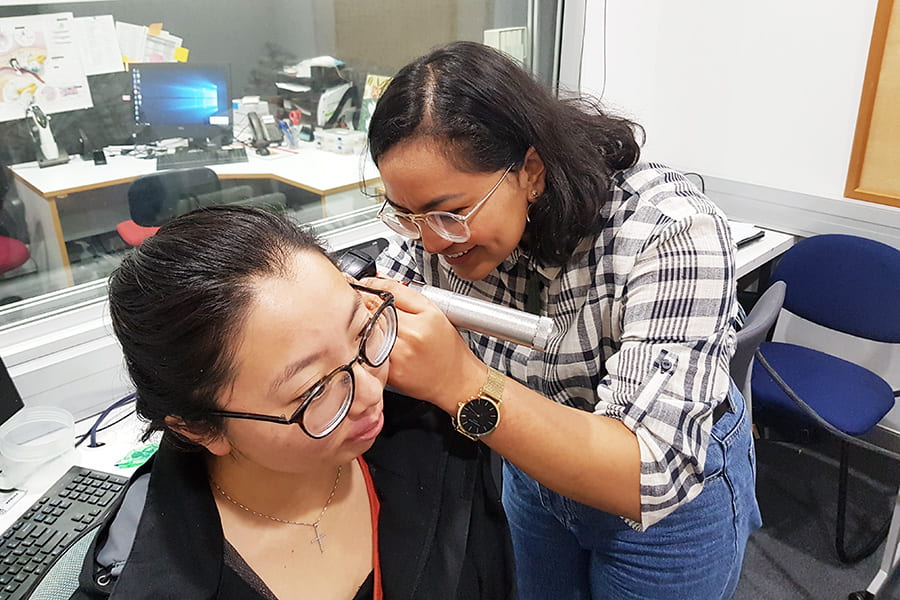Māori have the highest rate of self-reported disabling hearing loss in New Zealand and Alehandrea (Aleh) Manuel is leading research into how sufferers are accessing services to do something about it.
The work is part of both an Eisdell Moore Centre (EMC) programme and a PhD for the centre’s Māori Hearing Research Co-ordinator – looking at Māori experiences with hearing loss and hearing health services, and at how clinicians provide services and work alongside them.
A key element of Aleh’s approach is rooted in kaupapa Māori research by Māori, for Māori, with Māori – research that recognises one size does not fit all.
“There’s the Māori world, there’s the Western world, there’s the Hard-of-hearing world, there’s the Hearing world, there’s the Deaf world,” she says.
”The current hearing health care system has been built to favour the dominant Western Hearing world”.
Aleh, who is an audiologist and has a Bachelor of Health Science and a Post-Graduate Diploma in Public Health, says she’s aware of the issues facing Māori accessing general health services, including racial, cultural, financial and geographical, and she wants to understand if the same issues apply to hearing health care as well.
She says the cultural barriers can include issues such as lack of culturally appropriate environments, and limited cultural safety training, while health literacy (understanding terminology and documents), and education about the problems can also be factors.
Her work dovetails with her PhD titled Taringa Whakarongo (Listen with your ears) that is studying older Māori and whānau experiences and perspectives of the same issues.
For Aleh, the issue is personal.
“Members of my whānau have occupational noise exposure hearing loss” she says.
“My uncle has one-sided deafness from birth and my partner’s mother has an acoustic neuroma – a tumour in the auditory pathway – that has been removed, but that side has lost hearing.”
Another driver for her research came in 2013 summer internship with Dr Grant Searchfield at the University of Auckland looking into barriers to hearing health care services for Māori and Pacific peoples that turned up a disturbing result – there was little information to be found.
That, coupled with her personal experience, developed a “need” to do something about Māori hearing health, and in 2013 she moved to Queensland to add a Master of Audiology to her suite of qualifications.
She turned down the opportunity to attend medical school to do it.
“There was something in me that wanted to go to hearing health care,” she says. “My whānau were like, ‘why, why?’ and I’m like ‘because I have found a passion in this area’.”
After completing her audiology degree in Brisbane at the end of 2014, Aleh, who is Māori-Filipino and of Tuwhakairiora, Ngāti Porou descent, worked in Townsville for three years on new-technology wideband research for diagnosing middle-ear issues. It was her work there that confirmed her heart was in hearing health care for indigenous people.
Aleh returned to New Zealand in 2018 to start her PhD, and this year began her work for the EMC. She also works part-time as an audiologist at Auckland’s Greenlane Hospital.
Her brief from the Eisdell Moore Centre is to build networks and connections with communities to facilitate safe research for Māori in hearing health care, and to learn ways where clinicians and researchers can work with Māori communities in a culturally appropriate manner.
“One word for my role is facilitator.”
Aleh says the Treaty of Waitangi is a key element in the health equation because it covers self-determination – a principle that applies to the right of Māori to determine issues like care for their hearing health and how they access it.
“Everyone has the right to have access to quality health care,” she says. “What the document is saying is tangata whenua have the right to self-determine that from their own way, and we have a responsibility to honour Māori ways of knowing and thinking.”
One of the keys to achieving that is quality research that will identify attitudes and barriers, and potential strategies and solutions – work that for Aleh is a passion.
